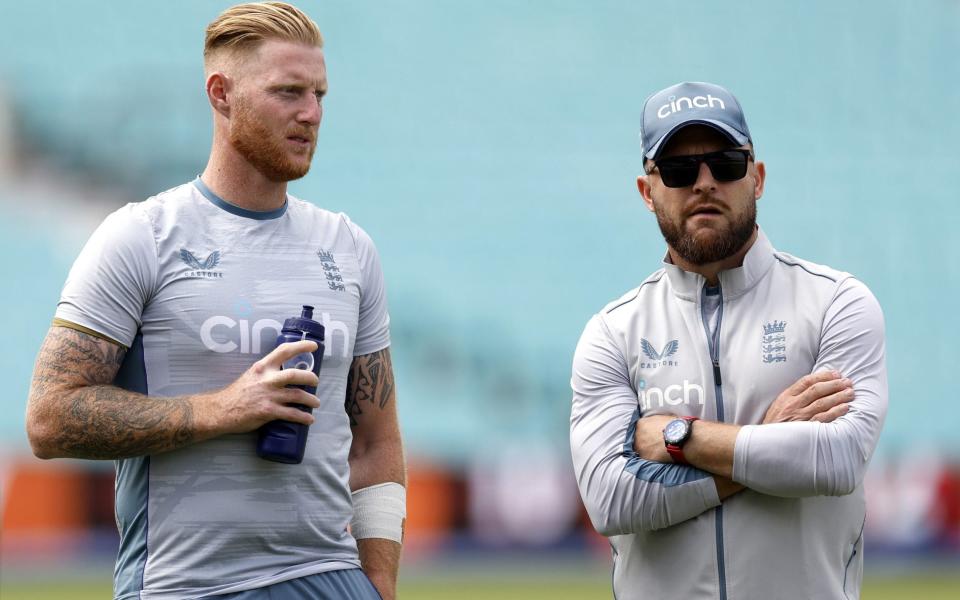Ben Stokes and Brendon McCullum tell counties to embrace ‘Bazball’ revolution

Ben Stokes and Brendon McCullum have told the 18 first-class counties to embrace their new fearless 'Bazball' philosophy as part of a major attempt to bring greater alignment and collaboration within English cricket.
Stokes and McCullum, the England Test captain and coach, addressed a meeting of county directors of cricket about the way that they are seeking to play and the qualities that they are looking for in potential international players.
While counties retain complete control over their playing style, Stokes and McCullum discussed the kind of cricketers they are looking for the county game to produce to fit into their new way of thinking.
The meeting took place at the Hilton in St George’s Park, home of the England football team when Gareth Southgate’s squad convenes. While Stokes and McCullum – who is back home in New Zealand - dialled in for around an hour over Zoom, the county directors of cricket also held long in-person discussions with Rob Key and Mo Bobat, England’s managing director of men’s cricket and performance director respectively.
Ensuring greater alignment between the national team and the counties, and emphasising the role that counties can play in helping the England team, was a major topic of discussion. Since 2015 there has been a pipeline of players to graduate to the international limited-overs side playing in the same style as the England team.
It is hoped that greater clarity about what the Test side requires will now ensure a similar pipeline of talent for the Test side, enabling England to build on their stunning run of nine victories in 10 Tests since the start of last summer.
The meeting was not prescriptive and counties will always be free to play in a way that they see fit. But giving directors of cricket a greater awareness about the needs of the national team will help them to maximise the chances of their players graduating to the England set-up, and ensure a steady supply of cricketers who play in a similar style.
The chances of meaningful buy-in from counties are greater because of England’s outstanding recent results and the attractive style of cricket under Stokes and McCullum – which is likely to be highly appealing to the county membership.
'It's an attractive proposition, the way they’re playing'
There is an understanding that not all players can play in the same buccaneering way as has been England’s hallmark under McCullum and Stokes. But Key and Bobat shared insights into what they are seeking to achieve and a general ethos about the mindset that England are seeking to foster with directors of cricket.
This entails players focusing on optimising their unique strengths and playing in a style that best showcases these, and a recognition that batsmen are generally at their best when they can be freed up.
At all levels of red-ball cricket, England are aiming to develop a culture in which players and coaches are not constrained by how things have been done in the past.
One county director of cricket said that the message to batsmen was, “If you have the basics in place as a batter, be prepared and open to experiment. Don’t be constrained by fear of getting out, making a mistake. Try to take your game forward, be aggressive and show what you can do.”
England players returning to the County Championship, and players pushing for Test selection, will be encouraged to play in a positive manner. But there is no expectation that counties will replicate England’s scoring rate in Pakistan, when the side scored at 5.5 runs an over throughout the three Test matches, with Key and Bobat emphasising the autonomy of counties in dictating strategy.
The meeting was not focused on Test cricket alone. Matthew Mott, the limited-overs head coach, also addressed the directors of cricket as England look to continue their outstanding run in the white-ball game, which has seen the side become the first ever men’s team to hold both the one-day international and T20 World Cups at the same time.

More regular meetings between senior England figures and the counties, to ensure a stronger sense of connection between the national team and the first-class game, is planned for the years ahead. This effectively implements one of the recommendations of last year’s High Performance Review, which advocated ‘Picking the right players at the right time: requiring clear selection criteria that is communicated to players and counties.’
The meeting hints at a thawing of relations between counties and the England & Wales Cricket Board, which have been strained since the High Performance Review.
“From a county’s point of view it's incredibly positive because it’s an incredibly attractive proposition, the way they’re playing the game,” said Steve Elworthy, Surrey’s acting director of cricket.
He said that the clear messaging about what England’s Test team seek would have a knock-on effect on the style players adopt in the county game. “They ultimately want to play for England and you need to do whatever you can to help with that.
“There should be something that is a bit more your core DNA of what it means to play for England. You then also need county captains and directors of cricket to bring their own personalities and imprint to that.”
Another county director of cricket said he welcomed the clear messaging from England.
“Communication from Rob, Mo has been pretty good. They need to work with the counties because that’s where players are produced.
“They were very clear they won’t be preaching to the counties that we want you all to score at 4.5 or 5 an over and declaring and making a game of everything. That’s not what they are trying to do. They are trying to make Test cricket entertaining and successful.
"No, they are not in the business of telling counties they want us to play the game in a certain way to suit England’s needs.”
Rise of England's Test team will lift counties with them if they copy Bazball style
By Tim Wigmore
From the All Blacks to Barcelona during the golden era of La Masia, the best teams tend to have an identity that transcends any one individual. Instead, they establish a culture so strong that, even when the characters change, the team’s ethos - and, normally, their results too - remain the same.
In recent years, England’s limited-overs side have established a similarly durable team culture. In November’s T20 World Cup final, England were missing five first-choice players. Yet the players who stepped up could be relied upon to play in the same style: a testament to how, since the reboot after the 2015 ODI World Cup, England’s identity has permeated down from the national side. “In white-ball cricket in England, it's quite ingrained in people the style of cricket that we want to play,” England limited-overs skipper Jos Buttler observed in November.
Now, the hope is that England’s Test team can follow. At St George’s Park - where England's football team launched their DNA in 2014 - on Monday, representatives from all 18 first-class counties convened. There, they held discussions with Rob Key and Mo Bobat, England’s managing director of men’s cricket and performance director. And, by video link, they were addressed by Ben Stokes and Brendon McCullum, the captain and coach who have overseen the metamorphosis of England’s Test side: from a run of one win in 17 games to nine in ten.
Of course, all of this has been achieved while playing buccaneering cricket. England have scored at 4.77 an over in Test cricket under McCullum and Stokes - the highest that any nation in history has mustered over a 10-Test period.

When they addressed the counties, Stokes and McCullum were not prescriptive. Neither the captain and the coach made any mention of asking the counties to play in a certain way. But the pair - like Key and Bobat - made clear the sort of players that they would like in the England Test team.
“Ben wants selfless cricketers to come in, buy into the environment of what the England cricket team are all about - by doing that, their games and their skills will naturally flourish,” says Marcus North, the director of cricket at Durham, Stokes’s county. At St George's, England made clear their preference for players to focus upon maximising their strengths - rather than worry about their weaknesses - who play the game in a positive way and are comfortable embracing what would once have been considered a high level of risk. The hope is that new players elevated to the Test team immediately play in the manner demanded in the national side, just as Ben Duckett and Harry Brook did in the 3-0 Test win in Pakistan.
Even while there is no suggestion of explicitly telling counties what to do, England’s style of play is likely to filter down to the County Championship. “What excites me is that this will influence and stimulate the way we play first-class cricket and so it should,” North says.
“It’s not reinventing the county philosophy about four-day cricket but I think you’ll naturally see an influence in individual players and also other coaches and clubs looking to take some of the bits they can do out of the philosophy that Brendon and Ben have.”
England's limited-overs teams have continued to play in the same audacious way since Eoin Morgan’s retirement. Ultimately the hope is that the partnership between Stokes and McCullum will have an impact that long outlasts their stints too.
At times, the national team has had a tendency to overcorrect from a perceived weakness of an old regime: for instance, the gallivanting approach of Trevor Bayliss as Test coach was replaced by the far more attritional Chris Silverwood. So a more cohesive national philosophy, which outlasts any individual, would represent a welcome change in English cricket.
Yet the opportunities for more productive alignment between the counties and the Test side go far beyond the style of cricket that teams play. In New Zealand, the national coach has sometimes contacted domestic coaches and requested that players be given a new role. For instance, BJ Watling was moved from specialist opener with Northern Districts to a wicketkeeper, the role he fulfilled very successfully for New Zealand, after a suggestion from the national head coach. But before Ollie Pope started batting at number three for England he had never performed the role in any first-class match; Surrey, his county, had no contact from England about whether he could bat there in the County Championship. There is also scope for greater collaboration between England and the first-class counties on pitches and the workloads of young players, especially quick bowlers.
And so the real impact of the St George’s Park summit could be to represent the start of more fruitful relations between England and the 18 first-class counties. Should it succeed then, in time, aggressive English Test cricket might not be thought of as the Stokes way or the McCullum way. It might simply be considered the English way.

 Yahoo Sport
Yahoo Sport 



































































